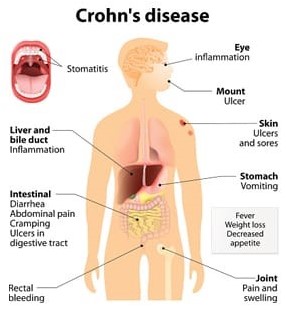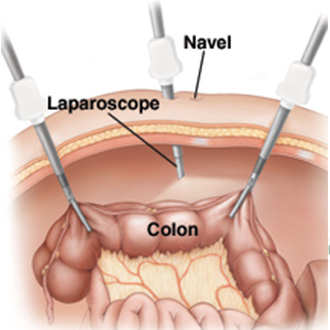Medicines or steroids, to reduce inflammation in your gut, are commonly used to treat Crohn’s disease when it first develops. They are usually taken in oral tablet form, or as an enema (a tablet inserted into your anus), if the rectum or lower part of the colon, are affected
Steroids
If the symptoms of Crohn’s disease are severe, a course of steroids (corticosteroids) may be recommended for a few weeks. In most cases (70%), the symptoms improve within four weeks of starting steroids. Once the symptoms improve, the dose is gradually reduced, and then stopped. As steroids can cause side effects, they are not usually used as a long-term treatment.
5-aminosalicylate medicines
5-aminosalicylate medicines can be used as an alternative to steroids, to treat mild to moderate symptoms of Crohn’s disease. They include sulfasalazine, mesalazine, of salazine, and balsalazide. However, they do not always work and you may need to switch to steroids if your symptoms are severe.
Antibiotics and immunosuppressants
Some people with Crohn’s disease do not respond well to steroids or 5-aminosalicylate medicines. In such cases, a specialist may advise that you use antibiotics to combat infection, immunosuppressive medicines,such as methotrexate, antibody therapy (infliximab), or a combination of these treatments.
Diet
If you have particularly bad symptoms, which cannot be controlled using medicines, you may be given a strict diet to follow. In most cases, after sticking to the diet for a few weeks, the symptoms improve and a normal diet can be gradually resumed. The reasons why this works are not fully understood, but it is thought that some foods, such as dairy products, may trigger the symptoms of Crohn’s disease and that resting the gut may help.
Surgery
As a last resort, if other treatments do not work, surgery may be required to remove the affected part of your gut. The affected part is removed and the two ends are sewn together. Surgery may also be required to treat complications such as obstructions, abscesses, or damage to your gut.
Laparoscopic surgery
This is now commonly done for segmental resections and is ideal for crohns patients as most crohns patients need 4-5 surgeries in their lifetime and keyhole surgery helps patients to undergo future without risk of severe adhesions and difficulties of redosurgery
Other measures
Anti-diarrhoeal medicines can be taken to firm up your stools, and painkillers may be needed at times when your symptoms are particularly bad. If your symptoms are really severe, you may need to go to hospital to receive fluid intravenously (by a drip).
You may be prescribed iron tablets if you develop anaemia. Also, if your gut is not absorbing food properly, you may need to take vitamin supplements. If you smoke, giving up will often decrease the frequency of your symptoms



